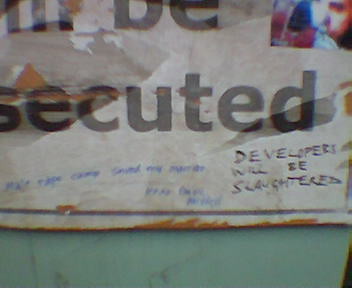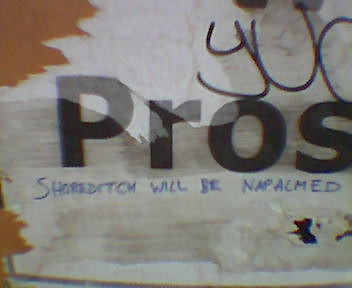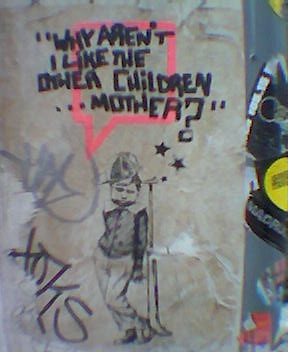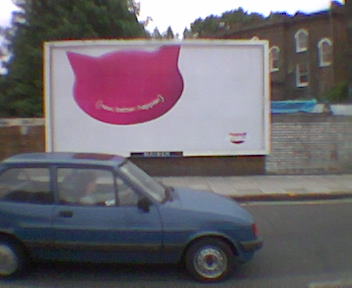If you have the Firefox web browser, and regularly use Google Scholar, then check out this wonderful little bit of tech. It basically adds a "saved searches" box to Google scholar, which lets you see if new articles have been added. Very useful for monitoring research. You'll need the Greasemonkey extension for Firefox. I love this idea of consumers customizing web pages.
Tuesday 28 June 2005
Then maybe you should read this red hot little number. (Just something I'm looking at at the moment. No, really, you do not have any reason to read this document.)
Thursday 9 June 2005
Game theory of killer initiatives and legislative responses to initiatives
(Just something I jotted down - a sample of the kind of work I do.)
A common institution in the context of direct legislation is to allow the legislature to respond to a proposed initiative. I put forward a game-theoretic rationale for having this institution, but point out some potential problems. The problems also apply to cases where interest groups outside the legislature sponsor “killer initiatives” which are drafted so as to affect other initiatives on the ballot box.
The rationale is as follows. We consider policy on a single dimension. The status quo is SQ and voter median ideal point is at MV. All utility functions are given by distance:
utility = |outcome – ideal point|
We assume that proposing an initiative costs C, and that the potential proposer is extreme, with ideal point marked PIP. MV' marks the point [MV + (MV -SQ)], i.e. the median voter is indifferent between MV' and SQ. To simplify, we assume that indifferent voters vote “yes” on all proposals.
SQ--------------MV-------------MV'----------------PIP--------
If the legislature may not respond to the initiative, and if MV' – SQ > C, then the proposer proposes an initiative at MV', which the voters accept. Policy is now as far from the median voter as it was before, but in the opposite direction.
Now suppose that the legislature can respond to proposed initiatives by bringing forward its own counter-proposal. If it does so, then the counter-proposal, rather than the status quo, will be the result if the ballot proposal fails. The legislature incurs no cost in bringing forward a counter-proposal: this seems reasonable, as it has no signature requirement to fulfil. Most likely the legislature's ideal point LIP will be at SQ: however, we consider all alternatives.
SQ--------LIP-----MV-------------Mv'----------------PIP--------
If LIP < MV: any proposal to the right of MV can be countered by a proposal to the left of MV, but closer to MV. Therefore, if MV – SQ > C, the proposer proposes MV; otherwise the proposer does nothing.
If MV' > LIP > MV, any proposal to the right of LIP will be met by a counter-proposal at LIP. Therefore, if LIP – SQ > C, the proposer proposes LIP; otherwise the proposer does nothing.
If PIP > LIP > MV' (ie legislature and proposer are both extreme), and if LIP – SQ > C, again the proposer proposes LIP or any proposal to the right. The legislature then responds with LIP and offers the public the unappealing choice between two proposals which are both less preferred to the median voter than the status quo. The result is LIP.
If LIP > PIP > MV' then proposer proposes PIP and legislature responds with PIP or any proposal to the right; here again, proposer and legislature collude to offer the public a Hobson's choice. The result is PIP.
In the latter two cases, a rule like the one outlined makes outcomes worse from the point of view of the median voter and the associated majority in his or her lea. However, these seem rather implausible: why shouldn't the legislature legislate directly, rather than take the roundabout initiative route? In the more plausible first two cases, the result is always better for the median voter. Allowing legislative counter-proposals essentially turns the contest into a classic Downsian two-horse race.
Potential problems
The institution as proposed above is rather simple. However, it doesn't always work like that. Switzerland allows the legislature to bring forward proposals in response to an initiative, but rather than replacing the status quo, they are voted on separately. If both the original initiative and the legislature's response pass, the legislature's proposal overrides the original initiative. (I think. Hey, this is a blog entry.) In a less institutionalised, but broadly similar way, “killer initiatives” are sometimes seen in the US. These are drafted so as to override the effect of another proposed initiative: again, if both pass, the killer initiative will specify limitations to the effects of its target.
We can model both these situations similarly, as proposers 1 and 2 decide in turn to propose initiatives. If both proposers introduce initiatives which pass, we assume that 2's proposal is implemented, as it contains clauses designed to nullify the effect of 1's proposal.
The choice situation facing the voter now becomes complicated and may require sophisticated voting – something that, it is often believed, voters in a direct democracy find difficult (e.g. Lacy and Niou 2000). That paper points out a similar result when preferences over two initiatives are non-separable. In this case, preferences over outcomes are single-peaked and the space of outcomes is one-dimensional: the problems arise because voters don't know what the effect of their vote will be. As an example, consider the following choice situation where two initiatives have been proposed:
---SQ--------------P2-------------P1---
Given single-peakedness, there are four possible preference profiles for voters:
SQ > P2 > P1
P1 > P2 > SQ
P2 > SQ > P1
P2 > P1 > SQ
The last two groups of voters have no problem: they can vote yes on P2, and yes or no on P1. A voter who happened to be decisive on either outcome could not possibly experience regret, as they would always have brought about an outcome which they preferred to the alternative – either by achieving the best possible result, P2, or by preventing P1 from supplanting the status quo, or by possibly allowing P1 to win (assuming P2 was not implemented).
The “extremists” in the first two groups are not so lucky. Consider first those who wish to preserve the status quo. A voter (or group of voters) who happens to be decisive on P2 faces the following set of choices:
| P1 outcome | Vote | Result |
| Passes | Yes | P1 and P2 pass: outcome P2 |
|
| No | P1 passes: outcome P1 |
| Fails | Yes | P2 passes: outcome P2 |
|
| No | neither pass: outcome SQ |
Clearly, if P1 is going to fail, it's better to vote no on P2 and preserve the status quo. Equally, if P1 will pass, you should vote for P2 in order to salvage something.
Partisans of P1 face a similar problem. They should vote for P2 if P1 is going to fail, but against P2 if P1 is going to pass. The problem in terms of votes is analogous to that mentioned in Lacy and Niou (2000). For example, a member of the first preference group has the following preference ordering for outcomes of the votes:
| P1 | P2 | Result | Ranking |
| N | N | SQ | 1 |
| N | Y | P2 | 2= |
| Y | Y | P2 | 2= |
| Y | N | P1 | 3 |
Thus, despite single-peakedness over the actual issue, we end up with non-separable preferences over the outcomes of votes.
Wednesday 8 June 2005
These are for myself but also public.
R project for statistical computing, in case you didn't know.
Adding a straight regression line to a plot
model = lm(y ~ x)
plot(y ~ x)
abline(model)
Adding a wiggly line to a plot
plot(foo ~ bar)
lines(lowess(bar, foo))
Tuesday 7 June 2005
Friday 3 June 2005
New York
The Guggenheim staff told me off for this.
For a few months I was a volunteer in the Simon Community, which deals with rough sleepers in London. There was a resident there who was a lot of trouble. He was very shrewd and insightful, and he could be extremely aggressive. Anyway, if he thought he was being messed around somehow , he would look straight at you and say: "I'm not a prick."
Brussels tried to get the European electorate to vote for a long, turgid, incomprehensible constitution - oops, sorry, constitutional treaty. (It was a constitution because everyone had to vote for it, but it was long and boring because it was a treaty. Got that?) If they didn't, the sky would fall in, there was no plan B, et cetera. To which the reply came: "I'm not a prick."
One more thing while I'm ranting. Various important Brussels people have been publicly puzzling, agonizing, over what the two No's can possibly "mean". Here's a clue: they mean No, you numbwits.























